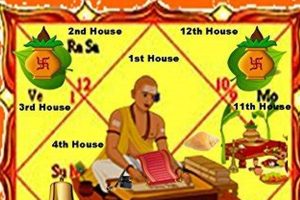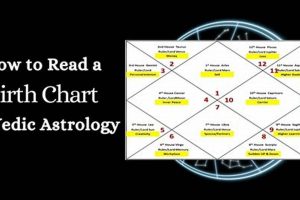Vedic astrology, also known as Jyotish, originated in ancient India and relies on the sidereal zodiac, which calculates planetary positions based on the fixed constellations of stars. Western astrology, primarily derived from Hellenistic traditions, employs the tropical zodiac, which measures planetary positions relative to the Sun’s apparent path along the ecliptic. This fundamental difference in celestial frameworks leads to variations in planetary placements and interpretations. For example, someone considered a Virgo in Western astrology might be a Leo in Vedic astrology.
Understanding the distinct foundations of these systems provides valuable insights into the diverse perspectives on astrological interpretations. This divergence stems from different cultural and philosophical underpinnings, enriching the field of astrology with a broader range of interpretive possibilities. The historical context surrounding these systems offers valuable clues to their development and current practice, contributing to a more nuanced understanding of individual charts and predictive techniques.
This exploration will delve into the core distinctions between these two astrological traditions, including the zodiac, planetary interpretations, predictive methods, and overall philosophical approaches. By examining these key elements, readers can gain a deeper appreciation for the rich tapestry of astrological thought and practice.
Given the distinct approaches of Vedic and Western astrology, navigating their differences requires careful consideration. These tips offer guidance for understanding and applying insights from both systems.
Tip 1: Ascertain the Zodiac System: Determine whether interpretations are based on the sidereal (Vedic) or tropical (Western) zodiac. This foundational difference significantly influences planetary placements and subsequent analysis.
Tip 2: Recognize Cultural Context: Acknowledge the cultural and philosophical origins of each system. Vedic astrology is steeped in ancient Indian traditions, while Western astrology draws heavily from Hellenistic and later European influences. This awareness provides crucial interpretive context.
Tip 3: Consider Predictive Techniques: Vedic astrology emphasizes predictive techniques like “dashas” (planetary periods), while Western astrology utilizes transits and progressions. Understanding these distinct predictive methods offers varied perspectives on future trends.
Tip 4: Research Astrologers Carefully: When seeking astrological consultations, ensure the astrologer’s expertise aligns with the desired system. Clarify whether they practice Vedic or Western astrology to avoid misinterpretations.
Tip 5: Integrate, Don’t Confuse: Both systems offer unique insights. Rather than viewing them as conflicting, consider how their perspectives can complement one another to provide a more holistic understanding.
Tip 6: Focus on Self-Discovery: Ultimately, astrology serves as a tool for self-discovery. Utilize insights from both traditions to gain a deeper understanding of individual strengths, challenges, and potential.
By incorporating these tips, one can effectively navigate the nuances of Vedic and Western astrology, gaining a broader and more insightful understanding of the cosmos and its influence.
This exploration concludes with a reiteration of the importance of a nuanced approach to astrological interpretations, encouraging further exploration of both traditions.
1. Zodiac System
The zodiac system forms the cornerstone of astrological calculations and interpretations, representing a key distinction between Vedic and Western astrology. A clear understanding of these differing zodiacs is crucial for comprehending the divergent perspectives offered by each tradition. This section explores the core components of the zodiac systems and their implications for astrological practice.
- Sidereal Zodiac (Vedic Astrology)
The sidereal zodiac, employed in Vedic astrology, is based on the observed positions of constellations. Planetary positions are calculated relative to the fixed backdrop of stars. This approach considers the precession of the equinoxes, a gradual shift in the Earth’s axis. Consequently, the sidereal zodiac maintains alignment with the constellations, resulting in a roughly 24-degree difference compared to the tropical zodiac. This difference accounts for the variations in zodiac signs between Vedic and Western calculations for the same birth date.
- Tropical Zodiac (Western Astrology)
The tropical zodiac, utilized in Western astrology, measures planetary positions relative to the Earth’s equinoxes and solstices. This system defines the starting point of the zodiac as the vernal equinox (around March 21st). As it does not account for precession, the tropical zodiac gradually drifts away from the constellations over time. This fixed seasonal alignment forms the basis for the Western astrological calendar and interpretations related to the seasons.
- Impact on Planetary Placements
The different zodiac systems lead to varying planetary placements in individual birth charts. A person deemed a Leo in Western astrology (tropical zodiac) might be considered a Cancer in Vedic astrology (sidereal zodiac) due to the roughly 24-degree shift. This discrepancy impacts the interpretation of planetary influences and personality traits associated with each sign.
- Interpretative Implications
The choice of zodiac system influences the entire astrological interpretation. Vedic astrology, employing the sidereal zodiac, often focuses on karmic influences and spiritual growth, correlating with its emphasis on the fixed cosmic backdrop. Western astrology, using the tropical zodiac, frequently emphasizes psychological and personality traits related to seasonal cycles.
This fundamental difference in zodiac systems shapes the distinct perspectives offered by Vedic and Western astrology. Recognizing this core distinction provides a framework for understanding the varied interpretations and predictions arising from these two rich astrological traditions. Further exploration of specific planetary positions and their interpretations within each system enhances this understanding.
2. Planetary Calculations
Planetary calculations constitute a core element distinguishing Vedic and Western astrology. Differing methodologies in determining planetary positions contribute significantly to variations in astrological charts and interpretations. Understanding these distinctions is essential for navigating the complexities of these two astrological systems.
- Ayanamsha (Precession of the Equinoxes)
Ayanamsha, the difference between the tropical and sidereal zodiacs, plays a crucial role in Vedic astrology’s planetary calculations. It accounts for the gradual shift of the vernal equinox against the backdrop of fixed stars. Various ayanamsha values exist, leading to slightly different planetary placements depending on the specific ayanamsha used by a Vedic astrologer. Western astrology, using the tropical zodiac, does not incorporate ayanamsha in its calculations.
- Planetary Dignities and Debilities
While both systems employ concepts of planetary dignities and debilities (strength and weakness based on zodiacal placement), the specific calculations and interpretations can vary. For instance, a planet considered exalted in Vedic astrology might not hold the same strength in Western astrology. These differences influence how planetary influences are assessed in each system.
- Use of Nakshatras (Lunar Mansions)
Vedic astrology utilizes nakshatras, 27 lunar mansions along the ecliptic, in its calculations. Nakshatras provide further refinement in assessing planetary influences, offering nuanced interpretations not typically found in Western astrological practice. Each nakshatra possesses unique qualities, enriching the understanding of planetary placements within the Vedic system.
- House Systems
While both systems divide the birth chart into twelve houses representing different life areas, the specific house system used can differ. Vedic astrology often employs the whole sign house system, while Western astrology utilizes various systems like Placidus or Koch. The choice of house system affects the placement of planets within the houses and consequently, the interpretation of their influence on specific life areas.
These variations in planetary calculations underscore the fundamental differences between Vedic and Western astrology. Recognizing these distinctions helps to avoid misinterpretations when comparing charts calculated using these two distinct systems. Further investigation into the specific methods employed within each tradition provides a more comprehensive understanding of their respective strengths and interpretative nuances. Ultimately, understanding these differences allows for a richer and more informed approach to astrological analysis.
3. Predictive Methods
Predictive methods represent a significant point of divergence between Vedic and Western astrology. Each system employs distinct techniques to forecast future trends and events, reflecting their unique philosophical underpinnings and methodologies. Examining these differences provides crucial insights into the distinctive approaches to forecasting within each tradition.
- Dashas (Planetary Periods – Vedic Astrology)
Dashas, planetary periods of varying lengths, form the cornerstone of Vedic astrological predictions. Each dasha signifies a specific planetary influence, shaping the individual’s experiences during its duration. For example, a Jupiter dasha might bring opportunities for growth and expansion, while a Saturn dasha might involve challenges and lessons. This focus on planetary cycles as primary predictive tools distinguishes Vedic astrology from Western methods.
- Transits (Planetary Movements – Western Astrology)
Western astrology emphasizes transits, the ongoing movement of planets through the zodiac, as a primary predictive technique. Analyzing planetary aspects (angular relationships) formed during transits provides insights into potential events and experiences. For example, a transit of Saturn over natal Venus might signify relationship challenges. While Vedic astrology also considers transits, they typically play a secondary role compared to dashas.
- Progressions (Symbolic Movement of Chart – Western Astrology)
Progressions, a symbolic movement of the birth chart, offer another predictive layer in Western astrology. By advancing planetary positions according to specific formulas (e.g., secondary progressions where one day equals one year), astrologers gain insights into the unfolding of individual potential and developmental stages. This technique allows for a deeper understanding of psychological growth and life cycles, an aspect less emphasized in traditional Vedic prediction.
- Annual Charts (Yearly Predictions)
Both systems utilize annual charts to forecast yearly trends. Vedic astrology employs techniques like the “Varshaphala” (annual chart) to predict specific events and influences during the year. Western astrology utilizes solar return charts (calculated for the moment the Sun returns to its natal position) for similar predictive purposes. While both systems utilize yearly charts, their specific methods of calculation and interpretation vary.
These distinct predictive methods highlight the divergent approaches of Vedic and Western astrology. Vedic astrology’s emphasis on cyclical planetary periods offers a framework for understanding karmic influences and long-term trends, while Western astrology’s focus on transits and progressions provides insights into current events and psychological development. Understanding these differences provides a comprehensive view of astrological prediction and allows for a more nuanced interpretation of future potentials.
4. Philosophical Basis
The philosophical underpinnings of Vedic and Western astrology represent a core distinction, shaping their respective approaches to interpretation and practice. Examining these philosophical roots provides crucial context for understanding the divergent perspectives offered by each tradition. This exploration delves into the core philosophical tenets and their influence on astrological understanding.
- Karma and Reincarnation (Vedic Astrology)
Vedic astrology is deeply rooted in the concepts of karma and reincarnation. The birth chart is viewed as a reflection of past actions, and astrological predictions are often framed within the context of karmic lessons and opportunities for spiritual growth. This emphasis on karmic influences shapes the interpretative framework of Vedic astrology, influencing its focus on remedies and practices aimed at mitigating negative karmic patterns. For example, specific gemstone recommendations or mantras might be suggested to address challenging planetary placements.
- Hellenistic and Medieval Influences (Western Astrology)
Western astrology draws heavily from Hellenistic and medieval philosophies, incorporating elements of Greek mythology, Aristotelian cosmology, and later, Renaissance humanism. This historical context influences the Western astrological understanding of planetary archetypes and their symbolic meanings. For instance, the association of Mars with war and aggression stems from its identification with the Roman god of war. Medieval interpretations added layers of astrological magic and the concept of planetary rulership over specific herbs and stones.
- Psychological and Individualistic Focus (Modern Western Astrology)
Modern Western astrology has increasingly integrated psychological and humanistic perspectives, emphasizing individual potential and self-discovery. This shift reflects the broader cultural emphasis on individual agency and psychological well-being. Psychological astrology, a branch of Western astrology, utilizes astrological insights to understand personality dynamics and promote personal growth, demonstrating a focus distinct from Vedic astrology’s karmic orientation.
- Free Will vs. Destiny
The interplay of free will and destiny constitutes another point of philosophical divergence. Vedic astrology, while acknowledging free will, emphasizes the influence of past karma in shaping present experiences. Western astrology, particularly in its modern iterations, often emphasizes individual agency and the potential to shape one’s future through conscious choices. This difference influences the approach to predictions and the degree to which individuals are seen as capable of influencing their destiny.
These differing philosophical foundations contribute significantly to the distinct approaches of Vedic and Western astrology. Understanding these philosophical roots enhances the interpretation of astrological charts and provides a richer appreciation for the diverse perspectives offered by these two traditions. Further exploration of specific philosophical texts and their influence on astrological practice provides a more nuanced understanding of these systems.
5. Cultural Context
Cultural context significantly influences the development, interpretation, and practice of astrological systems. Examining the cultural nuances embedded within Vedic and Western astrology provides crucial insights into their divergent perspectives. This exploration delves into specific cultural facets shaping these traditions and contributing to their distinct characteristics.
- Religious and Spiritual Traditions
Vedic astrology is inextricably linked to ancient Indian religious and spiritual traditions, including Hinduism, Buddhism, and Jainism. Concepts like karma, reincarnation, and dharma (cosmic order) deeply influence its interpretations and predictive methods. Western astrology, while influenced by early Hellenistic religious practices, has evolved alongside predominantly Christian and secular societies, leading to different philosophical emphases. For instance, Vedic astrology’s focus on remedies often involves rituals and practices rooted in Hindu traditions, while Western astrology generally emphasizes psychological analysis and self-awareness.
- Societal Values and Beliefs
Societal values and beliefs further shape the application of astrology. In societies where Vedic astrology is prevalent, astrological consultations often play a significant role in major life decisions, including marriage, career choices, and auspicious dates for important events. Western societies, while increasingly embracing astrology, often view it as a tool for self-discovery and personal growth rather than a deterministic system. These differing societal perspectives influence the types of questions addressed through astrological consultations and the expectations placed on astrologers.
- Transmission of Knowledge
The transmission of astrological knowledge also reflects cultural context. Vedic astrology has traditionally been passed down through lineages of gurus and scholars, often within families or specific communities. Western astrology, following the development of printing, has seen a wider dissemination of knowledge through books and educational institutions, leading to a broader range of interpretations and practices. These different modes of transmission have contributed to variations in astrological techniques and the development of distinct schools of thought within each tradition.
- Symbolism and Mythology
The symbolism and mythology incorporated into each system reflect their respective cultural origins. Vedic astrology draws heavily from Hindu mythology and symbolism, utilizing deities and celestial beings to represent planetary archetypes. Western astrology incorporates elements of Greek and Roman mythology, associating planets with gods and goddesses from these pantheons. These distinct symbolic frameworks influence the interpretation of planetary energies and their influence on human lives. For example, Jupiter, associated with Zeus in Western astrology, represents expansion and good fortune, while in Vedic astrology, as Brihaspati, it signifies wisdom and spiritual guidance.
These cultural facets significantly contribute to the divergence between Vedic and Western astrology. Understanding these cultural nuances provides essential context for interpreting astrological charts and navigating the distinct perspectives offered by each tradition. Recognizing the interplay of culture and astrological practice allows for a deeper appreciation of the rich tapestry of astrological thought and its enduring relevance across diverse cultures.
6. Evolution and Practice
The evolution and practice of Vedic and Western astrology have significantly contributed to their divergence. Vedic astrology, rooted in ancient Vedic texts and oral traditions, has maintained a relatively consistent lineage, preserving its core principles and techniques over millennia. Its practice remains deeply embedded within Indian culture, influencing daily life and rituals. Conversely, Western astrology experienced a period of decline after the classical era, only to be revived during the Renaissance, incorporating elements of medieval magic and later, psychological and humanistic perspectives. This historical trajectory has resulted in distinct approaches to interpretation and practice. For example, the use of dashas remains a central predictive tool in Vedic astrology, reflecting its continuous lineage, while Western astrology has developed a diverse range of predictive techniques, including transits, progressions, and solar returns, reflecting its multifaceted evolution.
The transmission of knowledge within each tradition further highlights their differing evolutionary paths. Vedic astrology has traditionally been passed down through guru-shishya parampara (teacher-student lineage), emphasizing oral transmission and personalized instruction. This traditional method has contributed to the preservation of specific techniques and interpretations within lineages. Western astrology, with the advent of printing, has seen wider dissemination of knowledge through books and educational institutions, fostering diverse interpretations and the development of distinct schools of thought. The availability of printed materials has democratized access to astrological knowledge, contributing to its broader reach and evolution within Western societies. Furthermore, the integration of modern psychological and humanistic perspectives into Western astrology reflects its adaptability to evolving cultural values and intellectual currents. This integration has led to the emergence of psychological astrology, a distinct branch focusing on personality analysis and self-discovery, a development not as prominent in traditional Vedic practice.
Understanding the evolution and practice of these systems provides crucial context for interpreting their differences. Recognizing the historical and cultural influences shaping each tradition allows for a more nuanced appreciation of their distinct strengths and limitations. While Vedic astrology offers a deep understanding of karmic influences and spiritual growth, Western astrology provides insights into psychological dynamics and individual potential. Ultimately, appreciating the distinct evolutionary paths of these traditions enables a more informed and comprehensive approach to astrological study and practice.
Frequently Asked Questions
This section addresses common inquiries regarding the differences between Vedic and Western astrology, offering concise and informative responses to clarify potential misconceptions.
Question 1: Which system is more accurate, Vedic or Western astrology?
Accuracy depends on the specific application and individual preferences. Vedic astrology excels in predictive techniques, while Western astrology often provides valuable insights into psychological patterns. Both systems offer unique strengths, and their effectiveness varies depending on individual needs and expectations. Neither system is inherently superior.
Question 2: How does the different zodiac system affect interpretations?
The sidereal zodiac used in Vedic astrology and the tropical zodiac used in Western astrology lead to different planetary placements in birth charts. This fundamental difference affects the interpretation of planetary influences and associated personality traits. For example, someone might be considered a Leo in Western astrology but a Cancer in Vedic astrology due to the zodiacal difference.
Question 3: Can someone use both systems for astrological guidance?
Yes, insights from both systems can offer a broader perspective. However, it’s essential to understand the underlying principles of each system to avoid confusion. Treat each system as a distinct lens through which to view the cosmos and its influence on individual lives. Integrating their perspectives can provide a more holistic understanding.
Question 4: Are the planetary interpretations the same in both systems?
While some planetary archetypes share similarities, interpretations can vary due to cultural and philosophical differences. For example, while both systems associate Venus with love and beauty, Vedic astrology may place greater emphasis on Venus’s role in relationships and marital harmony, while Western astrology may focus on its influence on aesthetics and personal values.
Question 5: Do both systems use the same predictive methods?
No, predictive methods differ significantly. Vedic astrology emphasizes dashas (planetary periods), while Western astrology focuses on transits and progressions. Vedic astrology’s predictive techniques are often oriented towards understanding karmic influences and long-term trends, while Western methods tend to focus on current events and their psychological impact.
Question 6: How can one choose the right astrological system for personal understanding?
Research and exploration are crucial. Investigate the core principles and practices of each system. Consider personal preferences and resonate with which system’s philosophical foundations. Consulting with astrologers from both traditions can provide valuable insights and help determine the most suitable approach for individual needs.
By addressing these common queries, a clearer understanding of the distinctions between Vedic and Western astrology emerges. This enhanced understanding allows individuals to navigate the complexities of astrological interpretations and make informed choices regarding which system resonates most effectively with their personal beliefs and goals.
This concludes the FAQ section. Further exploration of specific astrological techniques within each tradition is encouraged to deepen one’s understanding.
Distinctions Between Vedic and Western Astrology
Exploration of the core distinctions between Vedic and Western astrology reveals fundamental divergences in their zodiac systems, planetary calculations, predictive methodologies, and philosophical underpinnings. Vedic astrology, rooted in ancient Indian traditions, emphasizes the sidereal zodiac, planetary periods (dashas), and the concepts of karma and reincarnation. Western astrology, influenced by Hellenistic and medieval thought, utilizes the tropical zodiac, transits and progressions, and incorporates psychological and humanistic perspectives. These differences shape their respective approaches to astrological interpretation and prediction, offering distinct lenses through which to understand celestial influences.
The choice between these systems depends on individual preferences and the specific application of astrological knowledge. Recognizing their distinct strengths allows for a more nuanced and comprehensive understanding of the field. Further investigation into the rich tapestry of astrological traditions empowers individuals to make informed decisions about which system resonates most effectively with personal beliefs and goals. Ultimately, both systems offer valuable insights into the human condition and the interplay of cosmic forces, contributing to the enduring relevance of astrology across diverse cultures and historical periods.







